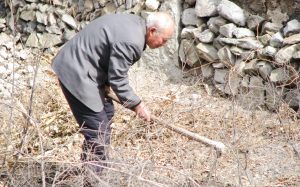In this section, we consider what it means to think analytically. This approach entails breaking down a topic and then reformulating it to provide a new perspective. This also gives us new insight into why the topic is important.
I am especially interested in statements that have this form: “If I think this . . . ., then the implication is this…..”
For example, if I think that humans are “by nature” good, then this assumption might lead me to believe that if I give everyone a chance to act on their best instincts–even those people who seem the most difficult–I can be confident that they are worthy of my trust. In contrast, I would be less trusting if I assumed that many, if not all, humans are “by nature” bad.
One can make the same point with the concept of the “human condition.” If I assume that the human condition is “solitary, poor, nasty, brutish, and short,” as the English philosopher Thomas Hobbes did, then it would be hard for me to be optimistic about the prospects for human progress.
Note: The concepts of “human nature” and “the human condition” do not mean the same thing, but our understanding of one can shape our understanding of the other.
My basic proposition is this: The way we define any aspect of human existence will have direct implications for how we understand the world. We have already seen this in many of our readings.
These questions relate directly to the next concept in our course: Prescription. How is our conception of Hell related to our moral options?
16. Tuesday, October 15
To assess the implications of different ideas about Hell, we shall consider a topic that has come up frequently in our discussions: The Human Condition.
To facilitate this discussion, I am asking you to read two of the most vivid chapters in Fyodr Dostoevsky’s extraordinary novel, The Brothers Karamazov.
As you read the chapters, ask yourself: What is Ivan Karamazov’s implicit “argument” about the human condition? What do you make of his recommendations about how we should live? Focus specifically on his parable about the Grand Inquisitor.
An excerpt from Fyodr Dostoevsky, The Brothers Karamazov. Ivan Karamazov’s sobering thoughts on “Rebellion” and the poem of the Grand Inquisitor.
PRINT AND READ only Chapter IV (“Rebellion”) and Chapter V (“The Grand Inquisitor) HERE
“Chemical Attack in Syria” READ
To bring Dostoevsky’s “argument” up to date, consider these two readings about the science of Free Will: Can we change the human condition by exercising our Free Will? Conversely, do we actually have Free Will?
Robert Sapolsky says NO: READ
Moshe Szyf and other collaborators say YES (or, perhaps, MAYBE): READ
I like what Szyf concludes about his research with rats because it gives us reason for hope:
“It wasn’t important what gene you got from your mother. It was not the biological mother that defined this property of these rats. It is the mother that took care of the pups. …. we spent 10 years, and we found that there is a cascade of biochemical events by which the licking and grooming of the mother – the care of the mother – is translated to biochemical signals that go into the nucleus and into the DNA and program it differently. So now the animal can prepare itself for life.”
Paragraph Assignment: “What argument can Alyosha present to effectively rebut Ivan’s horrific depiction of human nature?”
17. Thursday, October 17
Today, we will discuss the implications of the related–but not identical–concepts of “human nature” and the “human condition” for the organization of society. We will do this by discussing the messages of each of the following works:
Sartre, the Catechism (“Hell”), O’Connor, and the lessons of Abu Ghraib
You will see that you can also weave Urrea and Dostoevsky into this discussion
On the Tuesday after break, we will discuss Peter Singer’s chapter “Taking Life: Humans”
This is a challenging and quite shocking essay. You will need to read it more than once to understand it. Reading it the night before class won’t work. Note, too, that there are two other important readings. Also, there is a paragraph assignment. Please begin now.
Mid-Term Break: October 20-27
IMAGE FIVE
UTILITARIANISM: “HELL BY NUMBERS”

18. Tuesday, October 29
Discussion:
Today, we will discuss the moral implications of utilitarian judgments of Human Worth. The issues Singer raises–and the policies he endorses–suffuse that current-day controversies over genetic engineering, abortion, mercy killing, and assisted suicide that divide Americans today.
Peter Singer, “Taking Life: Humans” PRINT AND READ Please let me now if you have any problems with this link.
Harriet Johnson, “Unspeakable Conversations” PRINT AND READ
See the Catholic Church’s Social Teaching on the Dignity of the Human Person PRINT AND READ
What has COVID-19 taught us about our attitudes about the value of human life? Has the pandemic changed our calculations of value?
“Who lives and who dies?” READ
For this discussion, I recommend that you surf around for a very general understanding of the philosophical approach known as “utilitarianism.” Do not worry about identifying all the different types of utilitarianism. Our focus is on Singer’s type. Just think of a general description of his use of the term.
Paragraph Assignment: What does Singer mean by treating humans humanely? Is he right?
As you read Singer’s work, compare and contrast it with another perspective on human worth that is reflected in the passage from Jacques Maritain below. Maritain was one of the greatest Catholic philosophers of the twentieth century and the intellectual father of Vatican II:
“Let us think of the human being, not in an abstract and general way, but in the most concrete possible, the most personal fashion. Let us think of this certain old man we have known for years in the country—this old farmer with his wrinkled face, his keen eyes which have beheld so many harvests and so many earthly horizons, his long habits of patience and suffering, courage, poverty and noble labor, a man perhaps like those parents of a great living American statesman whose photographs appeared some months ago in a particularly moving copy of a weekly magazine. Or let us of think of this certain boy or this girl who are our relatives or our friends, whose everyday life we well know, and whose loved appearance, whose soft or husky voice is enough to rejoice our hearts . . . . We perceive intuitively, in an indescribable not inescapable flash, that nothing in the world is more precious than one single human being.”
—Jacques Maritain, “The Immortality of Man” (1941)
I thought of this passage when I ran into this farmer in the seven hundred year-old peasant village, Cuandixia, in the dry mountainous terrain on the outskirts of Beijing, China. What can you learn from how he is dressed?
into this farmer in the seven hundred year-old peasant village, Cuandixia, in the dry mountainous terrain on the outskirts of Beijing, China. What can you learn from how he is dressed?
19. Thursday, October 31
The Second Great Debate!
Topic: “When it comes to human dignity, Singer is far more humane than the Roman Catholic Church”
Re-read the Catholic Church’s Social Teaching on the Dignity of the Human Person: PRINT AND READ
For important background information on the humane treatment of non-homo sapiens: WATCH
IMAGE SIX
POVERTY: “POOR AS HELL”
20. Tuesday, November 5

Discussion: How should we describe American poverty? How can we explain it?
In this section, we will concentrate on one of the primary sources of poverty in the US: Eviction.
Matthew Desmond, Evicted: Poverty and Profit in the American City: READ the Prologue and chapters 1-5, 8, 12.
I am not poor; I have never been poor. I have certainly never been evicted. Chances are, this is the case with most–if not all–of you. Thus, when we think and talk about poverty and then seek to explain it, we are challenged to understand something we have never experienced.
Identify the central argument in this review of Robert Putnam, Our Kids: The American Dream in Crisis READ
Eviction Lab: Tracking Eviction CONSIDER
We can also seek to understand poverty by asking what it means to be fabulously wealthy
About Mona Chalabi’s “Nine ways to imagine Jeff Bezos’ Wealth” READ
Paragraph assignment: “If we say that the causes of eviction are systemic, does this means that no one bears individual responsibility for the fact that it happens?
21. Thursday, November 7
We will take the opportunity today to talk about the outcome of the 2024 Presidential election.
Your Second Essay Assignment is right HERE
22. Tuesday, November 12
“We who are strong have an obligation to bear with the failings of the weak, and not to please ourselves.”
ROMANS 15:1
What are our obligations to the poor, if any? Assuming we have obligations: 1) where do they come from? and 2) what should they be? Is there anything we can learn from the poor?
Matthew Desmond, Evicted: Poverty and Profit in the American City: READ chapters , 15-16, 24, and the Epilogue.
As you reflect on the stories in Evicted, ask yourself: What are the implications of the way we explain poverty? How do different explanations support or, conversely, our moral obligation to help the poor?
The authors of this article identify a moral obligation in the proposition that poverty is the consequences of structural barriers.
Heather Hahn and Margaret Simms, “Poverty Results from Structural Barriers, not Personal Choices” PRINT AND READ
In contrast, Garrett Hardin’s understanding of the sources of poverty leads him to believe that we have, at best, a minimal obligation to help the poor.
Garrett Hardin, “Lifeboat Ethics: The Case Against Helping the Poor”: PRINT AND READ (you only need to read the first 3 1/2 pages to get an idea of the significant difference between Hardin’s position and that of Hahn/Simms).
What would Jesus say?
James 2:14-17
What good is it, my brothers and sisters, if you say you have faith but do not have works? Can faith save you? If a brother or sister is naked and lacks daily food, and one of you says to them, “Go in peace; keep warm and eat your fill,” and yet you do not supply their bodily needs, what is the good of that? So faith by itself, if it has no works, is dead.’
23. Thursday, November 14
Rather than having our normal class session, I will hold office hours during our class time to give you the opportunity to discuss your papers with me.